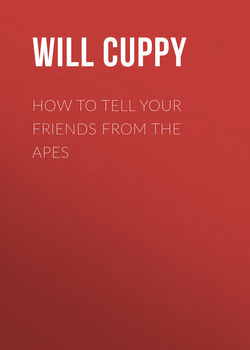Читать книгу How to Tell Your Friends from the Apes - Will Cuppy - Страница 9
На сайте Литреса книга снята с продажи.
PREFACE
ОглавлениеI HAVE BEEN ASKED several times just what I mean by writing another book. I’m not sure that I mean anything in particular. People have been known to write dozens of books. This is only my second. So much for that.
And then the title. Why did I call the book “How to Tell Your Friends from the Apes” when I could so easily have called it “Random Gleanings from the Natural History of the Early Assyrians”? Well, that title had already been used. So had “Outlines of Comparative Physiology.”
I still mourn for “Outlines of Comparative Physiology.” There’s a title that has everything: grace, sparkling wit, scientific significance and as much sex appeal as you can bring to it. Talk about romance!
Other titles were dropped for various reasons. You may think that people will let you call your own book “Notes on the Larger Fauna of the Strait of Magellan, Western Patagonia and Tierra del Fuego.” Well, they won’t! And I can see now that “Is the Horse Doomed?” was no name for a zoölogical work aiming to deal with practically all of our dumb brothers. Besides, we all know that the Horse is doomed. Why keep rubbing it in?
Things went on like that most of the summer, until one day – that terrifically hot day – something seemed to snap, and I knew that I had been writing “How Dante Became the World’s Most Famous Bookend.” Since then I have agreed to a few slight changes in the wording.
Certain persons have asked me whether the title as it now appears is a steal from “How to Tell the Birds from the Flowers,” by Robert Williams Wood, a sterling little volume in verse and pictures published in 1917 and still going strong. To this somewhat tactless inquiry I have decided to answer yes. Why argue the point?
The truth is that I have long regarded Mr. Wood’s book as a step in the right direction. We need more and yet more of these how-to-tell books, for isn’t it high time that we learned to tell a few things apart in this topsy-turvy old world? Let’s have more light on the subject, then. Let’s start right now and see who can tell the most things apart. In that way we may get somewhere.
Now about my central problem. Ninety per cent of the adult humans examined by me stated that they had never found any difficulty in telling their friends from the Apes. I wonder if some of these good people aren’t kidding themselves? The other ten per cent refused either to face the facts or to be pinned down about buying the book. In several instances I got the distinct impression that I was dealing with Gibbons.
I grant you there are plenty of old-fashioned and pretty ineffective ways to tell one’s friends from the Apes. What could be simpler, for instance, when you are at the Zoo? The Apes are in cages.
Yes, but when you are not at the Zoo, what then?
As for my style, as represented in my brief and all-of-a-piece biographies, an acquaintance wishes to know if I intend to go on writing in chunks for the rest of my life. That is a matter I have not yet decided. I may, and I may not. How on earth does one know whether or not one is going to go on writing in chunks?
Nor must I omit the usual acknowledgments. During my labors I found time for my first intensive study of Aristotle, whose “History of Animals” provided me with a footnote or two. The more one peruses this author, and ponders upon him, the more one realizes the wide range, the almost universal scope of his misinformation. I cannot help thinking that is why his pupil, Alexander the Great, was so simple in some respects. You know what the Intelligence Tests showed during the War; and isn’t that the answer to everything, when you come right down to it? I fancy that conditions in Ancient Greece weren’t a whole lot different.
Fortunately, there are others. Elsewhere in this volume I have confessed my not inconsiderable indebtedness to Isabel Paterson. From my frequent debates with her about the animals, I gathered whatever in these little sketches may prove of lasting worth. A reviewer of “How to Be a Hermit” said that he had long regarded the undersigned as a figment of Isabel Paterson’s imagination. I could wish that this legend might persist, for I know of nobody at all of whose imagination I should feel prouder and more signally honored to be a figment.
In closing I would say that if I have succeeded, however imperfectly, in my efforts to amuse, if I have served to while away an idle hour, if I have caught within these pages aught of profit or of pleasure – in short, if I have written the best book of the season, I shall be very much surprised.
